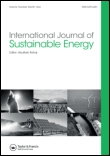
International Journal of Sustainable Energy
Scope & Guideline
Pioneering Innovations in Renewable Energy
Introduction
Aims and Scopes
- Sustainable Energy Production:
Research on innovative technologies and methodologies for producing energy sustainably, including solar, wind, hydro, geothermal, and biomass energy. - Energy Policy and Economics:
Studies exploring the economic implications and policy frameworks necessary for the transition to sustainable energy systems, including carbon pricing and energy security. - Energy Efficiency and Conservation:
Investigations into methods and technologies that enhance energy efficiency in various sectors, including residential, industrial, and transportation. - Environmental Impact and Sustainability Assessments:
Research focusing on the environmental implications of energy systems and technologies, including life cycle assessments and emissions evaluations. - Integration of Renewable Energy Systems:
Studies on the integration of renewable energy sources into existing energy grids and systems, including hybrid systems and microgrids. - Technological Innovations in Energy:
Exploration of new technologies and materials that can enhance energy production, storage, and consumption efficiency. - Socioeconomic Factors in Energy Transition:
Research examining the social, economic, and behavioral factors influencing the adoption of sustainable energy solutions.
Trending and Emerging
- Hydrogen as an Energy Carrier:
Research focusing on hydrogen production, storage, and utilization is gaining traction, highlighting its potential as a clean energy carrier and its role in achieving low-carbon energy systems. - Smart Grids and Energy Management Systems:
There is an increasing emphasis on the development of smart grid technologies and energy management systems that optimize energy distribution and consumption, reflecting the digital transformation in energy. - Circular Economy in Energy Systems:
Emerging studies are exploring the integration of circular economy principles within energy systems, emphasizing resource efficiency and waste reduction. - Decarbonization Strategies:
Research on strategies for decarbonizing energy systems, particularly in heavy industries and urban environments, is becoming more prominent as nations aim for net-zero emissions. - Decentralized Energy Systems:
Growing interest in decentralized energy systems, such as microgrids and community solar, reflects a shift towards local energy solutions that enhance resilience and sustainability. - Impact of Climate Change on Energy Resources:
Emerging research is increasingly addressing the impacts of climate change on energy resources and infrastructure, emphasizing the need for adaptive energy planning.
Declining or Waning
- Traditional Fossil Fuel Technologies:
Research related to traditional fossil fuel technologies has decreased, indicating a shift towards exploring renewable sources and sustainable alternatives. - Nuclear Energy Studies:
Topics focusing on nuclear energy, including its role in sustainable energy systems, have waned, possibly due to the growing emphasis on renewable energy sources. - Conventional Energy Storage Methods:
There is a noticeable decline in studies centered around conventional battery technologies, as the focus has shifted to novel energy storage solutions like hydrogen and advanced battery technologies. - Thermal Power Generation Analysis:
Research specifically analyzing conventional thermal power generation has decreased, suggesting a transition towards more sustainable and renewable generation methods. - Biofuels from Food Crops:
The exploration of biofuels derived from food crops has diminished, likely due to concerns over food security and the push for sustainable feedstock alternatives.
Similar Journals

Economics of Energy & Environmental Policy
Shaping Policies Through Economic Perspectives on Energy.Economics of Energy & Environmental Policy is a prestigious journal published by the International Association for Energy Economics, focusing on the intersection of economic principles and energy/environmental policy. Since its inception in 2012, this journal has provided a critical platform for researchers, professionals, and students interested in the multifaceted impacts of energy economics on society and the environment. With an impressive performance reflected in its 2023 Scopus rankings—Q2 in key areas such as Economics and Econometrics, Energy, and Management, Monitoring, Policy and Law—this journal not only contributes to academic discourse but also informs policymaking and industry practices. Although published as a traditional journal, its contents are vital for addressing contemporary challenges in energy management and environmental sustainability. Located in Cleveland, Ohio, the journal is committed to fostering innovation in energy economics, enhancing our understanding of the socio-economic dimensions of energy use, and promoting effective environmental policymaking.

Advances in Energy Research
Transforming Energy Research into Sustainable Practices.Advances in Energy Research is a prominent journal dedicated to the exploration and advancement of energy technologies and sustainable practices. Published by TECHNO-PRESS, this journal serves as a vital platform for researchers, professionals, and students in the energy field, featuring innovative studies and reviews that contribute to the body of knowledge surrounding energy efficiency, renewable resources, and the integration of new technologies. The journal holds a significant position in energy research and aims to facilitate the dissemination of groundbreaking findings and ideas that are pivotal for the transition toward a more sustainable energy future. Located in South Korea, with an ISSN of 2287-6316, it embraces an open access philosophy that ensures widespread availability of its content, further enhancing its impact in the academic community.

INTERNATIONAL JOURNAL OF GLOBAL ENERGY ISSUES
Transforming Energy Policies Through Scholarly InsightsThe INTERNATIONAL JOURNAL OF GLOBAL ENERGY ISSUES, published by INDERSCIENCE ENTERPRISES LTD, stands as a vital platform for disseminating innovative research in the fields of energy engineering, nuclear energy, and renewable sustainability. With ISSN 0954-7118 and E-ISSN 1741-5128, this journal has been catering to the energy sector since 1989, advancing scholarly dialogue through critical analyses and discussions of emerging energy technologies and policies. Though currently categorized in the fourth quartile across various energy-related disciplines, the journal aims to bridge knowledge gaps and offer insights that challenge the status quo. Operating from its headquarters in the United Kingdom and accessible to a global audience, the journal encourages submissions that drive interdisciplinary research and provide solutions for pressing global energy challenges. Researchers, professionals, and students alike are invited to contribute and engage with this prestigious journal to influence the future of energy practices.

INTERNATIONAL JOURNAL OF ENERGY RESEARCH
Pioneering research for a sustainable energy landscape.INTERNATIONAL JOURNAL OF ENERGY RESEARCH (ISSN: 0363-907X; E-ISSN: 1099-114X), published by Wiley-Hindawi, stands at the forefront of energy research, offering a scholarly platform pivotal for advancing knowledge in the fields of energy engineering, nuclear energy, fuel technology, and renewable energy systems. With an impressive Q1 and Q2 ranking across several categories as of 2023, this journal reflects a commitment to high-quality, peer-reviewed research that addresses both theoretical and practical challenges in the energy sector. Now an Open Access journal since 2023, it enhances accessibility and dissemination of cutting-edge research to a global audience. Located in the United Kingdom, with an active publication history dating back to 1977, the journal aims to contribute to sustainable energy solutions and innovative technologies. Researchers, professionals, and scholars will find valuable insights and discussions here, bridging gaps in energy research and policy-making.

Journal of the Japan Institute of Energy
Connecting Ideas to Energy Solutions.Journal of the Japan Institute of Energy, ISSN 0916-8753, is a reputable academic journal dedicated to the field of energy studies, reflecting the dynamic and evolving landscape of energy research. Published by the Japan Institute of Energy, the journal serves as a platform for disseminating innovative research, technologies, and methodologies related to energy engineering, renewable energy sources, and sustainability practices. While this journal does not currently offer open access, it remains a vital resource for professionals, researchers, and students alike, particularly those focused on advancing knowledge within Energy Engineering and Power Technology, Fuel Technology, and related areas. As of 2023, it is ranked in the Q4 quartile across several categories in Scopus, which highlights its foundational role in fostering scholarly discourse, despite its lower ranking in the competitive global landscape. Established in 1990 and continuously evolving, the journal provides insights into the challenges and innovations in the energy sector, making it an essential read for anyone invested in the future of energy solutions.
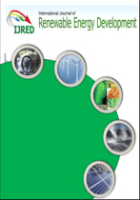
International Journal of Renewable Energy Development-IJRED
Exploring New Frontiers in Renewable Energy DevelopmentThe International Journal of Renewable Energy Development (IJRED), published by DIPONEGORO University in Indonesia, serves as a pivotal platform for scholarly research in the dynamic fields of renewable energy and sustainability. With a dedication to advancing knowledge since its inception in 2012, IJRED has embraced an Open Access model, ensuring that vital research is freely accessible to a global audience. The journal's impressive impact factor and its classification in the Q2 and Q3 quartiles across multiple categories—including Energy Engineering and Power Technology, Environmental Engineering, and Renewable Energy, Sustainability and the Environment—underscore its significance and authority in contemporary energy discourse. Indexed in Scopus, the journal consistently ranks among the top-tier publications, making it an essential resource for researchers, professionals, and students committed to innovating sustainable solutions in the face of climate challenges. Researchers are invited to contribute to this essential body of work as the journal continues to converge impactful research until 2024.
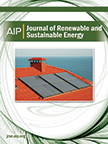
Journal of Renewable and Sustainable Energy
Shaping Sustainable Futures Through ResearchThe Journal of Renewable and Sustainable Energy, published by AIP Publishing, stands at the forefront of research in the fields of renewable energy and sustainable practices. With an ISSN of 1941-7012, this journal aims to foster innovative research and exchange of knowledge on sustainable technologies and methodologies that contribute to environmental conservation and energy efficiency. Achieving a prestigious Q2 ranking in the category of Renewable Energy, Sustainability, and the Environment, it ranks 135 out of 270 journals in Scopus, signifying its impactful contributions to the field. The journal, active from 2010 to 2024, provides a platform for authors, analysts, and practitioners to disseminate significant findings that can shape future environmental policies and energy frameworks. Although not currently an Open Access publication, it remains an essential resource for researchers dedicated to advancing sustainable development and energy solutions.

AIMS Energy
Advancing Innovations in Energy and SustainabilityAIMS Energy is a leading academic journal published by the American Institute of Mathematical Sciences (AIMS), dedicated to advancing the field of energy research. With a strong commitment to Open Access since its inception in 2013, this journal offers a platform for researchers, professionals, and students to share innovative findings and enrich the discourse in crucial areas such as Energy Engineering and Power Technology, Fuel Technology, and Renewable Energy, Sustainability and the Environment. Recognized for its quality, AIMS Energy holds a respectable impact with a Q3 ranking in multiple categories as of 2023, and it ranks within the top half of its peers in the Scopus database. The journal's objective is to disseminate high-quality research that addresses contemporary challenges in energy and offers sustainable solutions. By fostering collaboration and discussion among various stakeholders, AIMS Energy plays a critical role in shaping the future of energy technologies and policies.
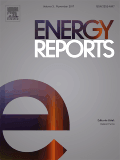
Energy Reports
Exploring New Horizons in Energy Research and TechnologyEnergy Reports, published by Elsevier, is a prestigious open access journal that serves as a vital resource in the field of energy research. Since its inception in 2015, this journal has swiftly ascended to become a key player in disseminating knowledge across various energy-related disciplines, evident from its impressive Q2 ranking in the miscellaneous category of Energy for 2023 and its notable position in the 78th percentile among over 70 journals in the general energy category, ranked 16th out of 73 on Scopus. Based in the United Kingdom, Energy Reports not only fosters innovative research but also promotes accessibility by providing open access to its articles, thereby ensuring that findings reach a global audience of researchers, professionals, and students. With a commitment to advancing sustainable energy solutions and technologies, Energy Reports plays a crucial role in shaping future energy policies and practices, making it an essential platform for scholarly communication in the ever-evolving landscape of energy research.
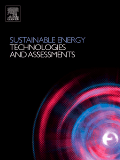
Sustainable Energy Technologies and Assessments
Driving Progress in Sustainable Energy TechnologiesSustainable Energy Technologies and Assessments is a prestigious journal published by ELSEVIER, based in the United Kingdom, focusing on the critical field of energy engineering and its intersection with sustainability. Since its inception in 2013, the journal has established itself as a leading platform for disseminating innovative research and assessments of sustainable energy technologies, earning a notable Q1 ranking in both Energy Engineering and Power Technology, as well as Renewable Energy, Sustainability, and the Environment. With an impressive Scopus ranking—#22 out of 272 in Energy Engineering and #40 out of 270 in Renewable Energy—this journal is essential for researchers and professionals seeking to advance their knowledge on cutting-edge developments and assessments in sustainable energy. Although the journal operates on a subscription basis, it remains committed to promoting high-quality research that aligns with global sustainability objectives. Researchers and students alike will find invaluable insights and data that shape the future of renewable energy technologies within these pages.